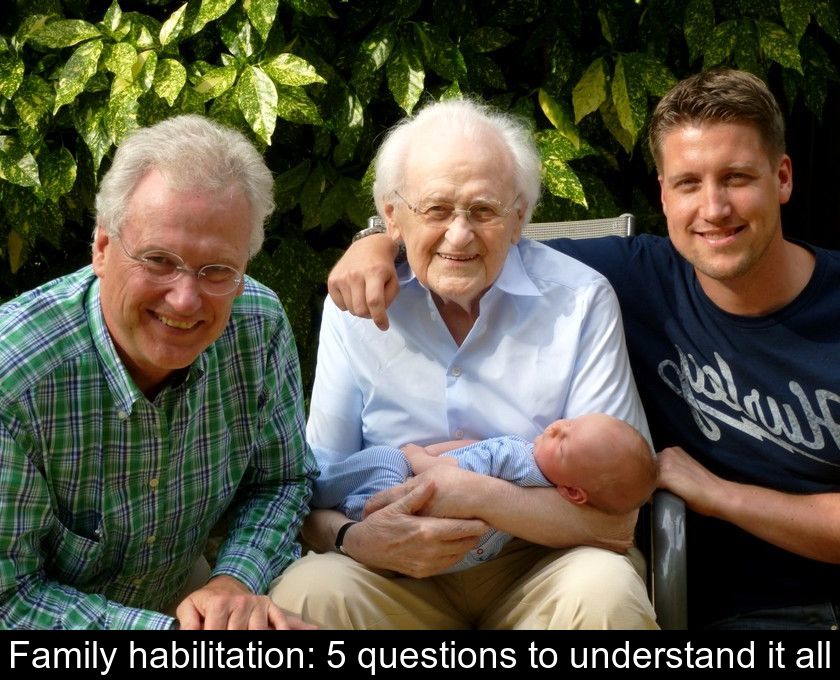Family Habilitation: 5 Questions To Understand It All
Family habilitation allows you to represent a relative who is no longer able to express his or her wishes or to carry out everyday actions. This protective measure, which is more flexible than guardianship or curatorship, simplifies life for all those who wish to help a relative. We suggest you understand everything about this measure in 5 questions.
1- How to apply?
Although more flexible than a guardianship or curatorship, family habilitation is granted to a relative by a decision of the judge.
The application for habilitation meets exactly the same requirements as a curatorship or guardianship.
In practice, you must first obtain a special medical certificate establishing the impairment of your relative's faculties, from a doctor chosen from a list set by the public prosecutor. This doctor may naturally seek the opinion of the doctor treating the person to be protected.
You must then send a request to the judge and attach this medical certificate as well as various supporting documents (in particular the identity document of the applicant and the person to be protected).
To examine the application, the judge will summon the applicant, the family and the person concerned, where possible. It is only at the end of these interviews that the judge makes a decision on the choice of the person(s) to be empowered and on the scope of the empowerment.
The judge may grant habilitation for a maximum period of 10 years renewable.
2- What are the different types of clearance?
There are two types of family habilitation of varying scope:
- the first, known as 'general', authorises extensive management of your relative's accounts and assets
- the second, known as 'special', strictly limits your intervention to a specific act, such as the sale of a property for example.
To be noted: if you want to know more about the different empowerments or the different existing protection measures, you can get information from a service called ISTF (Information and Support for Family Guardians). In each department, this free service aims to support families in their efforts to protect a vulnerable relative.
3- Who can receive this clearance?
It is important to know that only an ascendant (parents or grandparents), a descendant (children, grandchildren, great-grandchildren), a brother or sister, a spouse, a PACS partner or a cohabitant can ask to receive this family empowerment.
Whatever the relationship with the person to be protected, the empowered person carries out this mission free of charge.
To be noted: as the judge gives carte blanche for 10 years to the empowered person to manage a relative's assets, it is essential that there is good understanding within the family. If this is not the case, it is better to opt for curatorship or guardianship, which are more legally regulated.
4- What are the advantages of this measure?
Once the judge has granted family habilitation, the procedures are simplified for the person who has been granted habilitation.
The relative who has received this habilitation no longer needs to seek the judge's authorization to manage the protected person's assets (real estate, bank accounts, shares). For example, he or she does not have to wait for his or her green light to withdraw money from an investment.
Nor does the guardian have to send the judge an annual statement of the protected person's accounts.
5- What are the limits of this empowerment?
Family habilitation is a protective measure with safeguards. It does not mean that the empowered person has all the powers.
To carry out certain steps, the empowered person needs to obtain the prior agreement of the protection litigation judge (former guardianship judge).
This prior agreement is, for example, necessary before :
- making a donation
- changing the beneficiary clause of a life insurance contract
- selling the protected person's main residence
- terminate the rental contract of the protected person's main residence.
Did you know that?
If you wish, you can choose yourself the trusted person who will represent you later on, if you were ever unable to defend your interests due to an alteration of your mental or physical faculties.
All you have to do is fill out a future protection mandate, a very useful but still little known tool that allows you to choose a trusted person.
To give powers of management and administration to one of your loved ones, you can either fill out a pre-established template or sign a deed before a notary.







